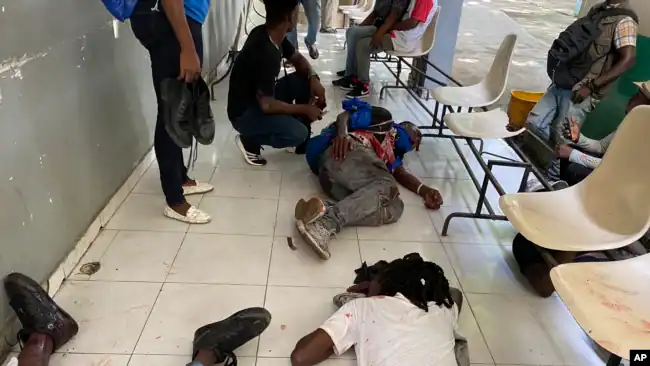By Adeyemi Adekunle
In a chilling escalation of violence, two reporters and a police officer were killed, and several others wounded during an attack by armed gangs at the reopening of Port-au-Prince’s largest public hospital on Christmas Eve. The hospital, closed earlier this year due to gang activity, was set to reopen under heightened security, but the event turned into a deadly ambush.
Journalists had gathered to cover the much-anticipated reopening of the General Hospital when gunfire erupted, sending attendees fleeing for cover.
The Online Media Collective confirmed the deaths of reporters Markenzy Nathoux and Jimmy Jean, with Nathoux serving as a part-time affiliate representative for USAGM. Seven other journalists were injured in the attack, alongside the fatal wounding of a police officer.
Haiti’s interim president, Leslie Voltaire, expressed condolences to the victims and vowed a strong government response. “This heinous act, targeting an institution dedicated to health and life, is an attack on the foundations of our society,” he stated in a televised address. However, the government has yet to provide a detailed breakdown of casualties.
Gruesome footage circulated online showed reporters injured and lifeless bodies on stretchers within the hospital, with one victim still wearing press credentials.
Witnesses and survivors pointed to the notorious Viv Ansanm gang coalition, led by Johnson “Izo” André, as responsible for the attack. André later posted a video on social media claiming responsibility and asserting that the hospital’s reopening had not been sanctioned by the gang.
Street gangs have solidified control over approximately 85% of Port-au-Prince, paralyzing critical infrastructure, including hospitals, prisons, and the main international airport.
The violence has severely strained Haiti’s health care system, with gangs looting medical supplies and destroying facilities. This has left the capital’s population grappling with limited access to care and heightened risks of disease outbreaks, including cholera, which has seen over 84,000 suspected cases this year.
Haiti has long been a perilous environment for journalists, with several high-profile killings in recent years underscoring the growing risks. The Haitian Association of Journalists condemned the attack, describing it as “a macabre scene comparable to terrorism, pure and simple.”
The reopening of the General Hospital was intended to symbolize resilience and recovery in a city dominated by chaos. Instead, the attack has underscored the deep challenges Haiti faces in restoring security and rebuilding its fragile institutions.




